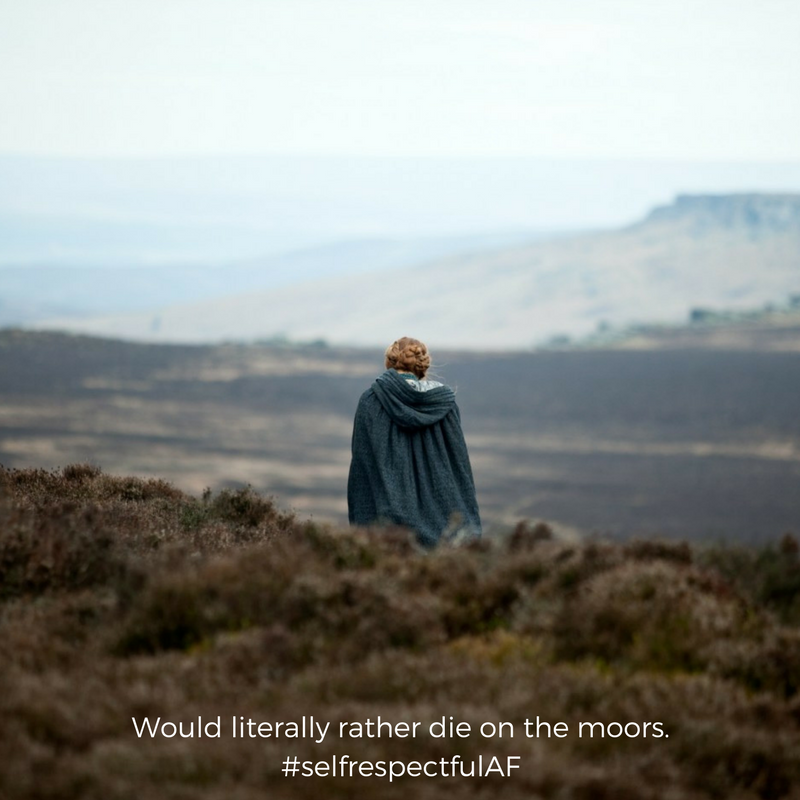There have been over sixteen English language film versions of Jane Eyre, beginning in 1910 with the first of eight silent movies based on the book. It’s entirely possible that - in the interest of research - I have watched most of these film adaptations of Jane Eyre. And equally possible that I created an elaborate rating system to determine the merits of each film.
Welcome to Thornfield
Have you ever loved a book so much that it felt like an old friend? Jane Eyre is that for me -- opening its pages is something like finding a familiar face in a crowded room. It has shared equally in times of joy and sorrow, and when I’m feeling down or in an unfamiliar place, I can start reading it and feel right at home.
When I discovered the book for myself, I quickly realized I was reading something truly original. I had been gorging on Victoria Holt novels about orphaned governesses and sardonic, handsome men for years but this one was clearly superior. Jane seemed like a fully realized person, and there was nothing flat or cookie cutter about the story even though I was familiar enough with the tropes. If you’re a fan of the genre and haven’t read it, you can easily recognize the story in Daphne du Maurier’s Rebecca and hear the wilder echoes of it in Wuthering Heights, among other things.
Why has Jane Eyre captured the imaginations of generations of readers? For starters, there’s the romance between Jane and Mr. Rochester. Full disclosure: when I’m feeling particularly self-indulgent, I start re-reading when she arrives at Thornfield or even when they meet in a most dramatic fashion shortly thereafter. Their conversations run the gamut from playful teasing to blood-stirring declaration, and beneath it all is Brontë’s wit and passion. The secret Thornfield harbors may be melodramatic to modern eyes and the language is admittedly a bit archaic, but the banter between Jane and Rochester still holds up. (It’s a shame the actual dialogue rarely makes it to the movie screen untouched, but more on that later.)
Spooky manor-house harboring a dark secret? Yes, there’s plenty of juicy drama here. Storms, fires, secrets -- everything you really need for a great Gothic novel! I don’t know that I could love the story as much without those elements, say if it were set in Peoria in 1972. But all of the fantastic murdery moments aside, it’s Jane herself who makes the novel so compelling. She’s feisty and passionate and grounded by an innate sense of self-respect. “I am no bird and no net ensnares me” isn’t just a Pinterest-worthy pull quote. Without being told by anyone else, living in a society that offered no such promise to women, Jane believes and lives by the premise that she is a “free human being with an independent will.” She defies all who would assert otherwise. Instead, she says, “I care for myself. The more solitary, the more friendless, the more unsustained I am, the more I will respect myself.” As relevant today as ever.
So just to break it down, we’ve got: an epic love story, spoopy Gothic accoutrements, dramatic murder times, and a feisty heroine who was way ahead of her time. If that’s not enough to tempt you, I am not sure how you got here.
The Four Reasons You Should Actually Be Wearing Perfume Oil
Perfume oils are having quite the moment, spreading from indie scent makers to big names like Tom Ford. It makes sense, given the current popularity of face oils and hair oils, but it’s not just a trend; perfume oils do have advantages to the more mainstream alcohol-based perfumes. They last longer, since alcohol evaporates from the bottle faster. This is a great thing for those of us who have a large collection of scents and hold onto things longer. You don’t waste as much during application either, since (according to perfume guru Chandler Burr), one loses about 50% of a spray of traditional perfume into the air.
Oil-based scents are much less drying to skin and hair than traditional alcohol-based perfumes. As alcohol evaporates to spread the fragrance of a traditional perfume, it takes with it your skin's natural oils, leaving your skin drier. Perfume oils are actually moisturizing, making them less irritating and more suitable for people with dry skin,
People are wearing fragrance differently, too, and perfume oil fits a more modern style of personal scent. Gone are the clouds of fragrance that announced one's entrance and lingered long after one's exit. Perfume oils tend to wear closer to the skin, which is bad if you want people to smell you across the room -- or the street -- but great if you are wearing them to the office or other environments where you want to enjoy your fragrance without offending others.
With the advent of mass-market fragrances, if you are searching for a unique, personal scent, indie and niche perfume oils are the way to go. There's a whole world beyond the department store perfume counter, made up of perfumes inspired by literature, fandoms, and much more. Not only is it fun to explore, but you if you want a true signature scent, you can find one.
A couple of tips about application, if you’re new to perfume oils, or perfume in general… Dab, don’t rub when applying your perfume. Rubbing the oil into your skin breaks down the more volatile top notes, such as citrus. If you have problems with the scent being absorbed too quickly, moisturize before you apply; a quick slick of petroleum jelly or a waxy, unscented lip balm can also help the fragrance adhere. Layering with a scented lotion in the same fragrance will also strengthen the effect of your perfume. As to where you should apply perfume oil to your body? Where you want to be kissed -- just as Coco Chanel so famously said.




